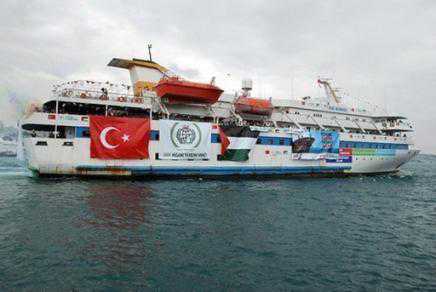Understanding the Turkish-Israeli row
by Şaban Kardaş*
| The deterioration of the relationship between Turkey and Israel has become a conspicuous element not only of Turkey’s foreign policy but also the overall course of recent affairs in the Middle East, raising questions about the future of the region’s security. | |
| The most immediate issue of contention in the relationship is Turkey’s demand that Israel apologize and compensate appropriately for the killing of eight Turkish citizens and one Turkish-American by Israeli commandos aboard the Mavi Marmara humanitarian aid ship in May 2010. The ship was part of a flotilla which was trying to break Israel’s naval blockade of the Gaza Strip and raise awareness of the humanitarian tragedy caused by the blockade. A proper explanation of the causes of the current stalemate, however, requires going beyond this singular event and undertaking a more nuanced analysis into the underlying dynamics shaping Turkish-Israeli relations in recent years, which also paved the way for the Mavi Marmara raid and the subsequent rapid deterioration of bilateral ties.
The Mavi Marmara incident and the ensuing crisis grew out of a complex background characterized by the Turkish government’s constant criticism, increasing in recent years, of Israel’s Palestinian policies, which especially gained momentum after Israel’s brutal offensive into the Gaza Strip in the winter of 2008-2009. Other events in the intervening period, including the Davos incident and “low chair” crisis, only accelerated the tensions. Efforts to find a solution through mediation or secretly discussing the ways in which Israel could issue an apology to Turkey failed. Given the high-level domestic stakes involved, both parties refrained from backing down and instead opted to continue their confrontational approach. Apparently, given their lack of urgency about reaching a compromise, they must also have calculated strategically that they could tolerate the costs of a breakdown in the relationship. Looking at the Palmer report Complicating matters further, the conclusions reached in the Palmer report, commissioned by the UN secretary-general to bridge the parties’ competing claims, have to the contrary risked deepening the divisions. The report’s controversial findings not only undermined Turkey’s efforts to internationalize the issue but also argued dubiously for the legality of the naval blockade of Gaza. In response, Turkey announced a series of punitive measures, intended to hold Israel accountable for the Mavi Marmara incident and challenge the legality of the blockade. Turkey’s statement that it would deploy its navy to ensure safe passage in the eastern Mediterranean was arguably the most contentious measure, as it could potentially escalate into a direct military confrontation. To understand Turkey’s perspective in the sequence of events culminating in the current standoff, one must look at a number of interrelated factors pertaining to the transformations of the strategic outlook of the Turkish foreign policy elite towards the new Middle East, and Israel’s role and place in it. First, Turkey has been working to redefine its priorities in response to what it perceived as a shift in the regional balance of power to its advantage. Second, Turkey viewed the declining influence and power of the United States, as well as President Barack Obama’s promise of a new American foreign policy in the Middle East, as an opportunity for regional powers to assert their influence. Third, and related to these points, Turkey has operated on the assumption that it has not only more space in which to maneuver but also a greater ability to develop autonomous policies in the region. Fourth, Turkey’s perception of threats from the Middle East has declined, reflected in the famous “zero problems with neighbors” policy, as Turkey pursued economic and political rapprochement with countries in the region. All these interrelated factors have coalesced in ways which have fostered a perception on the part of Turkish decision makers that a new Middle East is being built, one that is based on justice, equality and freedom, whereas Israel, with its power-based policies, remains stuck in a mentality representing the old Middle East. Turkish leaders saw themselves tasked with a project to build a peaceful and stable regional order based on principles of cooperative security, economic interdependence and universal moral standards. In this environment, the state of exception that Israel represented in the region, as reflected in Israel’s unjust policy toward the Palestinians, its defiance of UN decisions, its noncompliance with the non-proliferation regime and its protection by the US, was construed as an obstacle to Turkey’s regional aspirations. Unable to adapt to the new reality, Israel, in the Turkish perception, has increasingly isolated itself in the region and emerged as the source of regional instability. Believing that Israel can no longer afford to act in a business-as-usual fashion in the new Middle East, Turkey has moved to adopt moral politics, seeking to correct Israel’s policies. Consequently, the shared ground and joint strategic outlooks that enabled the Turkish-Israeli partnership of the 1990s has been replaced by a rather confrontational and competitive dynamic, which provide the background for the recent successive crises, especially since 2008. Through its moral politics, Turkey hoped that it could publicize Israel’s inhumane treatment of the Palestinians in various international forums, make it accountable before the international community, and eventually force it to recognize the Palestinians’ rights. Turkey somehow hoped the new foreign policy vision promised by the Obama administration would facilitate its pursuit of a moral politics with regard to Israel. Unwilling to yield to Turkey’s new posture, however, Israel refused to back down. At the same time, the complex dynamics of Israeli domestic politics limited the prospects for a negotiated settlement with Turkey, including some form of an apology and compensation to the victims of the Mavi Marmara raid. In this environment, Turkey’s insistence on linking the Mavi Marmara dispute with its demand that the Gaza blockade be lifted further pitted the two countries against each other, as the Israeli side was apparently unconvinced that the closure of the Mavi Marmara incident alone would settle the dispute. Last but not least, though the United States has not come out against Turkey’s increasingly assertive stance against Israel, it has not joined Turkey’s bandwagon either, rendering Turkey’s moral politics largely ineffective. The declining influence of the US has in effect meant that there is no actor capable of mediating between the parties. Turkey’s constructive role in the recent Hamas-Israel prison swap deal and its implementation raised expectations that the Turkish-Israeli tension might ease, as well. After all the events that have transpired, however, there will be no easy going back, and it will be hard to salvage the relationship without a significant transformation in the strategic outlooks of both sides. Turkey expects Israel to change drastically, which is unlikely to happen in the foreseeable future. *Şaban Kardaş is an assistant professor of international relations at TOBB University of Economics and Technology in Ankara. *.html
|



